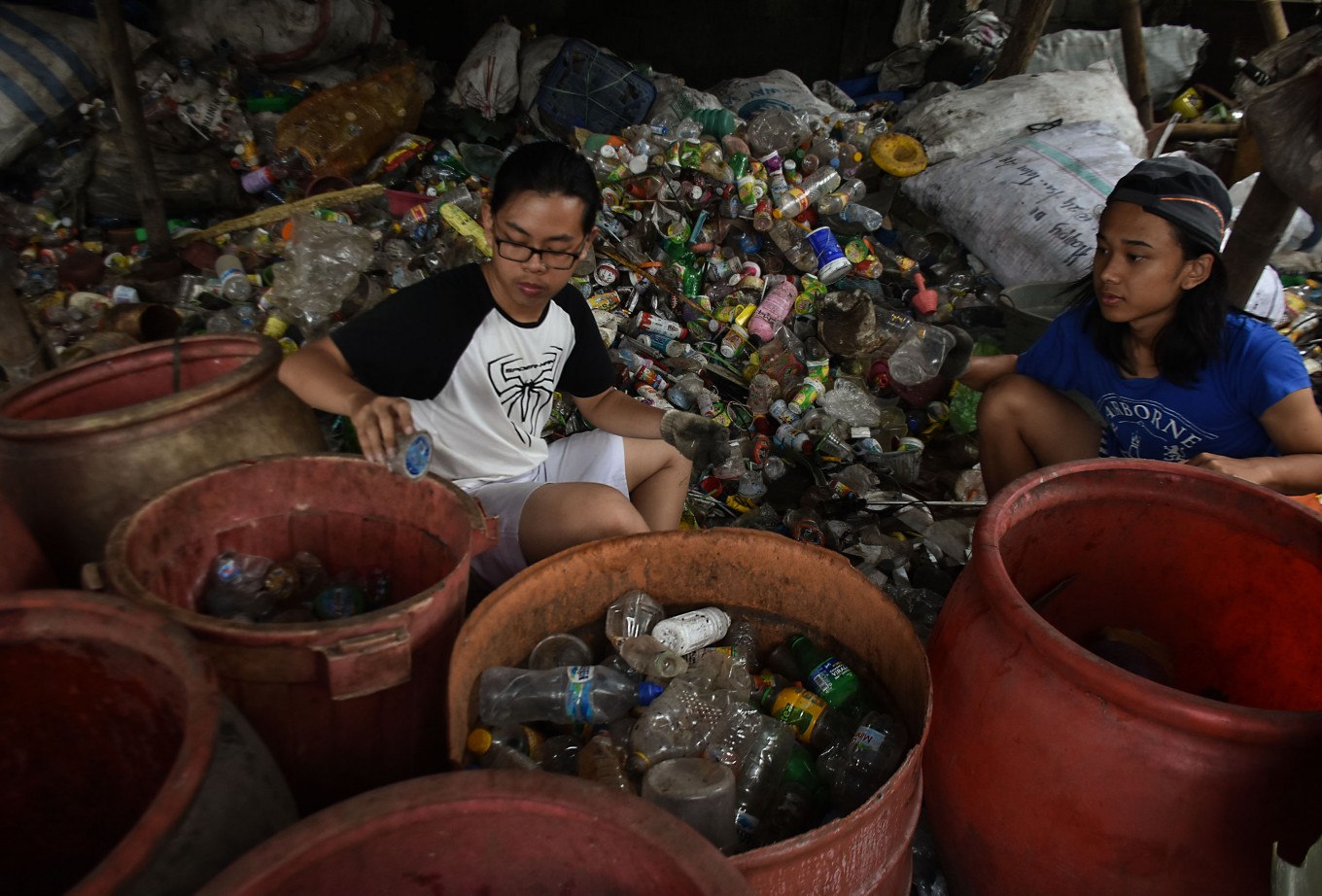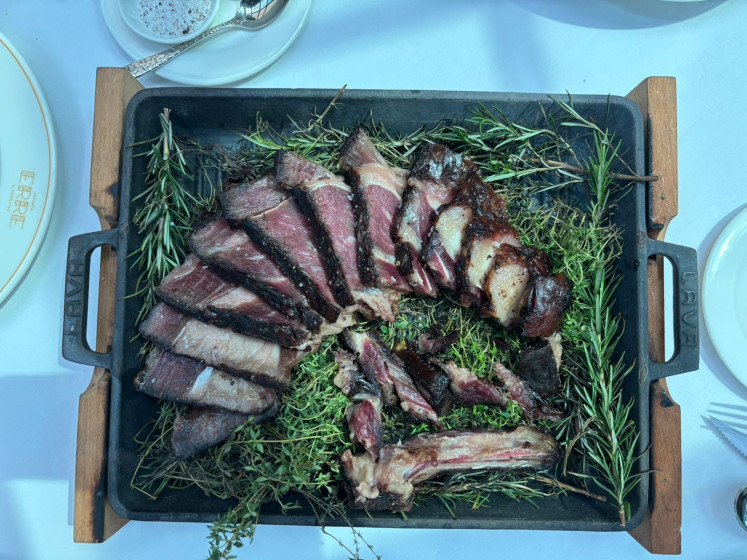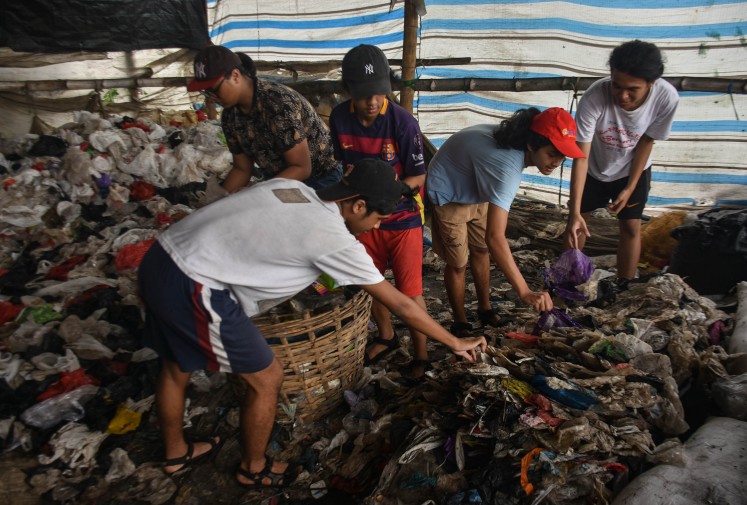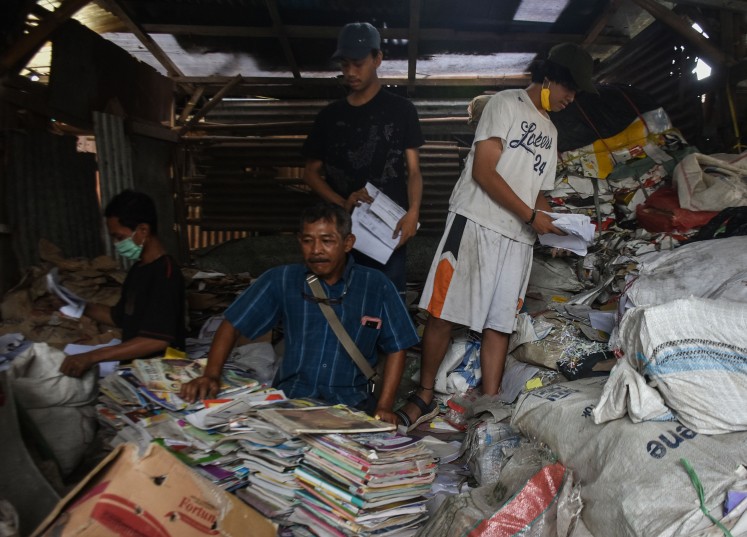Popular Reads
Top Results
Can't find what you're looking for?
View all search resultsPopular Reads
Top Results
Can't find what you're looking for?
View all search resultsIn Malang, students learn about hardship through the eyes of scavengers
“I was shocked when we first came. I couldn’t eat because it blended with the smell of garbage. After three days, I adapted because I felt that it was not easy to get a plate of food," shared one of the participating students.
Change text size
Gift Premium Articles
to Anyone
A
rotten smell wafts through what was once the Lowokdoro final disposal site (TPA), a place made into a temporary plastic waste-processing facility by scavengers. Some young people help scavengers sort plastic bottles, used paper and plastic bags.
This is a snippet of Kolese De Britto Yogyakarta high school's field activity for student character building.
“Last week, I met three high school teachers from Yogyakarta. I did not know them, but they knew me from the news. They expressed their wish to entrust their students to learn about the real life of the poor living by recycling plastic waste so that they would learn to appreciate others, to care and help them, and to be honest,” said Suladi, 62, on Wednesday.
Suladi added that the place had not been used as a landfill since 1994. It now served as a plastic waste bank for recycling and scavenging.
“There are 30 students, all of them are male. They came on Monday morning and learned here for five days.”
The activity started at 8 a.m. and included an hour-long lunch break. The students continued sorting waste until 3 p.m.
“From bottles, plastic cups, plastic bags and books, we taught them how to select waste that is in the marketable category and encouraged them to learn what our lives were like, for instance, separating plastic bottles from glass bottles during the sorting process, cleaning up the brand stickers and then sorting them by color."
“We have to identify types of metals (aluminum, zinc, iron and copper). The sorted materials are then packed and weighed. For five days, these students slept and ate three times a day – [meals] prepared by us. After completing these activities, they were not allowed to go anywhere and had to sleep at the scavengers’ homes,” he said.
The 30 students in this learning activity brought neither money nor devices with them. For five days, they had only a single plastic bag of clothing.
One of the participants, Anzelmus William, an 11th grade IPS (social sciences) major who hails from Bekasi in West Java, told this live-in story to other eleventh grade students of IPS, IPA (natural sciences) and Bahasa (language).
The activity was mandatory for all students, and they were required to keep a diary throughout the process.
“I was shocked when we first came. I couldn’t eat because it blended with the smell of garbage. After three days, I adapted because I felt it was not easy to get a plate of food," shared Anzelmus.
Read also: Spotlight on teachers as Indonesian student competence worsens
“I was reminded of my parents who worked hard to meet our needs. It is difficult to make a living. I was also reminded of dishes on the dinner table. Sometimes, I was reluctant to eat them and preferred to eat outside [the house], even though preparing meals was definitely not easy. When this learning activity ends, I will apologize to my parents and finish all the food my mother cooks."
Anzelmus said the experience helped him learn about the lives and struggles of scavengers, "[…] especially Pak Suladi, who maintained his honesty, patience and unyielding attitude when he was still a police officer and with his creativity turned garbage into additional money for his family. Looking ahead, along with friends, we would like to make a waste bank to learn entrepreneurship and reduce the impact of plastic waste."
“The point is, in order to live and be successful, we have to work hard, be honest and help others, also be grateful to God for all the blessings we have received in terms of economy and health, because there are others who aren’t as lucky," he said.
Suladi said that he was glad that there was a school willing to teach students about the reality of living as a scavenger.
"Moreover, these days everything seems easy and digitalized, so children these days seem spoiled and uncreative when faced with hardships and are dependent on the internet," the retired National Police officer said.
“Here students learn patience through sorting waste – also thoroughness and struggle. I hope that when they return home and to school, they are equipped – as the future generation of Indonesia – to value honesty, modesty and have respect for every penny earned, alongside hard work, helpfulness and respect towards their parents. If they one day become public officials, they can be trusted and will not be corrupt,” Suladi added. (vel/kes)













